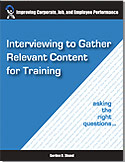Training content: garbage in, garbage out
As
a training development consultant, technical writer, or subject matter expert (SME), your single most
important task is to identify relevant content for the resources you are
developing. Relevant content contributes to business success by improving your
customerís employee, job, and corporate performance. Training and reference
resources that contain content that is relevant, useful, and practical help
employees work safely, effectively, and efficiently. No matter how impressive
the presentation may be, if the content isnít relevant, the training isnít effective.
With
effective consulting, instructional design, and development processes, you can
develop quality training for a variety of disciplines and technologies. To do
so, you must provide leadership when working with Subject Matter Experts (SMEs) to identify
content important for training.
It
is always a delight to interview SMEs who are exemplary; these people are
usually excellent thinkers who know what is important for the job. It stands to
reason that if exemplary workers use generic thinking strategies and ask
the right questions to perform exceptionally well, then we should emulate
their strategies to identify what is important to improve employee, job, and
organizational performance.

|
The book, Interviewing to Gather Relevant Content for Training, identifies many of the thinking strategies used by exemplary workers because the strategies provide the foundation for effective interviewing. Many of these thinking strategies are address in previous posts. Asking the right questions is an essential skill and is part of the thinking strategies. The relationship between instructional design and relevant content is also addressed. |
Interviewing to Gather Relevant Content for Training also provides suggestions on how to plan and conduct interviews
to gather and structure relevant content so that:
∑
you can write effective
training and reference resources (such as self-instructional modules),
knowledge test items, and procedures
∑
your training and reference
resources will help improve peopleís performance
Most
of the suggestions in this book are based on many consultantsí collective
experiences interviewing to gather relevant training content.
When
developing customized training, do you find it difficult at times to determine
the content important for the training? Do you think using generic thinking
strategies that focus on the selection of content which contributes to
employee, job, and corporate performance (i.e., business success) is useful?
Gordon
Shand is President of HDC Human Development Consultants Ltd. He has 35 years of
experience designing and developing educational and training programs that have
excellent practical value and contribute to the customerís business success. www.hdc.ca